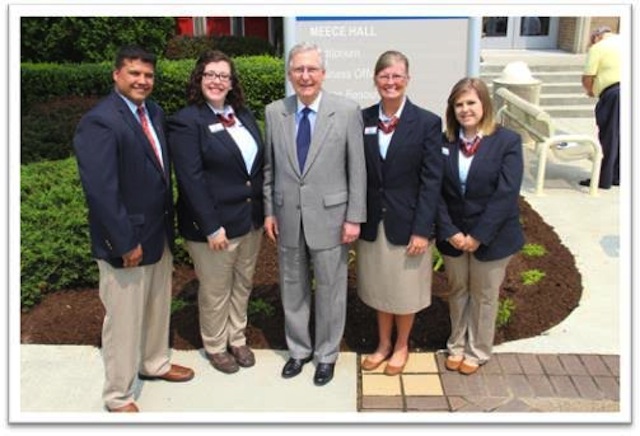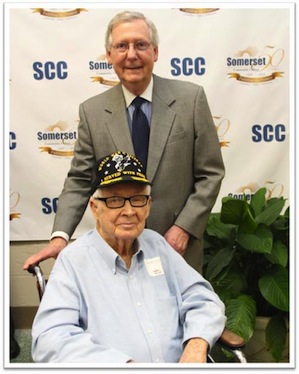| ||||||||||
Dr. Ronald P. Rogers CHIROPRACTOR Support for your body's natural healing capabilities 270-384-5554 Click here for details 


Columbia Gas Dept. GAS LEAK or GAS SMELL Contact Numbers 24 hrs/ 365 days 270-384-2006 or 9-1-1 Call before you dig Visit ColumbiaMagazine's Directory of Churches Addresses, times, phone numbers and more for churches in Adair County Find Great Stuff in ColumbiaMagazine's Classified Ads Antiques, Help Wanted, Autos, Real Estate, Legal Notices, More... 

|
SCC hosts Senator McConnell for John Sherman Cooper Lecture "He was my hero. In all my years of public life, there's been no one from whom I've learned more." - U.S. SENATOR MITCH McCONNELL By CHRIS HARRIS Commonwealth Journal* SOMERSET, KY. - There are few lawmakers walking the streets of Washington D.C. today more qualified than Sen. Mitch McConnell to talk about one of Somerset's favorite sons, the late Sen. John Sherman Cooper. It's not just that he holds the same type of office, from the same Republican Party, from the same state. McConnell was an intern of Cooper's in his early days climbing the political ladder, and knew Cooper not just as a politician, but as a man. "He was my hero," said McConnell. "In all my years of public life, there's been no one from whom I've learned more." It's fitting, then, that McConnell be a return visitor to the John Sherman Cooper Lecture Series, held by Somerset Community College. McConnell was the series' first speaker, and did so again on Tuesday at the 11th annual event, which saw a capacity crowd at Meece Auditorium on the north campus of SCC. McConnell, the current Senate Majority Leader following Republican victories last November -- flanked on the SCC stage by the college's president and CEO, Dr. Jo Marshall, and U.S. Rep. Hal Rogers from Somerset -- shared with the crowd both the accomplishments and the secrets of success enjoyed by Cooper, who served in the U.S. Senate off and on from in 1946 to 1973. Born here in Somerset, Cooper first rose to prominence as an attorney, then became the seventh member of his family to serve as county judge. That's before Cooper became "the global Kentuckian" as McConnell noted, U.S. ambassador to India and East Germany -- a simple man from Somerset who came to be known and respected around the world. Cooper's work helping those who had little money and plenty of troubles as a legal leader here in Pulaski County helped shape his political outlook, as he helped personally feed and clothe and provide lodging and medical care for those who lacked such things. "Cooper regularly encountered impoverished constituents who needed help and had nowhere else to turn," noted McConnell. "Cooper's generosity of spirit knew no bounds. ... The strain of trying to help so many in so much need was exhausting. As a result, he suffered a serious prolonged bout of depression. Characteristically, however, he persevered." Cooper joined the U.S. Army in 1941 to participate in World War II, where he undertook "a variety of sensitive missions" in four years. One exotic-sounding effort involved trying to locate a missing Italian princess. This quest had no storybook ending, however; Cooper later learned she had perished in an air attack, and Cooper would witness "humanity at its very worst" when the search took him to the infamous Buchenwald Nazi concentration camp near Weimar, Germany. "There he went and saw firsthand the unspeakable images of the Holocaust. ... It was a moment seared into Cooper's memory forever." Cooper's career in the U.S. Senate got off to a complicated start, as three times he was elected to fulfill an unexpired term -- first in 1946 to replace A.B. "Happy" Chandler, who had left to become Major League Baseball's commissioner, then again following Sen. Virgil Chapman's death in 1951, and once more to replace Alben Barkley. This last time, he served from 1956 up to his retirement 16 years later, winning his last election in 1966 by a considerable margin. "He had at last found his footing," said McConnell. "... John Sherman Cooper was a Republican in an overwhelmingly Democratic state. So the question is, how did he do it?" McConnell gave credit to Cooper's prominent family and his wife Lorraine, a hostess extraordinaire. But it was the senator's own personal marks of character that made him such a formidable political titan -- even though he'd likely be the last person to say that. "His style on the stump was unconventional, in part because it reflected another important and endearing Cooper trait: modesty," said McConnell. "... Cooper's speeches were not fire and brimstone, but rather candor and humility." He extended this softness of spirit across the aisle, becoming known as a championship of bipartisan cooperation. He even struck up a close friendship with President John F. Kennedy, despite their differences in age and party affiliation, and became a trusted resource for the president. "If Cooper's unconventional style frustrated many Democrats, his voting record frustrated many conservatives," said McConnell. "Both sides still voted for him in droves." This involved opposing Sen. Joseph McCarthy's "heavy-handed tactics" in attempting to root out communists in the 1950s, noted McConnell, and being an "early and vigorous" supporter of civil rights legislation "at a time when that cause was not a popular one." McConnell knew that well from being a young intern sorting through the senator's angry mail from numerous Kentuckians on the matter, though Cooper was "undeterred" -- and stated that he didn't just represent Kentucky, he represented the nation. McConnell said two types of people entered the political arena -- those who wanted to make a point, and those who wanted to make a difference. Cooper "always wanted to make a difference," he said. "I've witnessed a number of promising careers get derailed by endlessly trying to settle scores," he added. "Cooper realized that you need to be able to work with others. ... There's no use in holding grudges or burning bridges. To that end, Cooper was the consummate bridge builder." McConnell said it was in foreign affairs where Cooper left perhaps his greatest mark, earning the trust of the leaders of India and venturing into volatile East Germany during the Cold War. "He was fundamentally a decent person who treated all with respect," said McConnell. The John Sherman Cooper Lecture series event which featured Sen. McConnell -- and also included introductory words from Rogers -- is one of numerous special events Somerset Community College is holding to celebrate its 50th anniversary this year. With a special fund set up in Cooper's name at the college and the legacy he left behind for many aspiring young people in this community -- even if they only know him from his statue on the fountain square -- the Cooper Lecture Series has become an important tradition at SCC. Cooper was "everything you would want in a public servant," said McConnell, "... a man we can all rightly be proud to call our own." *Used with permission. www.somerset-kentucky.com/news/mcconnell-cooper-was-my-hero/article Somerset Community College is a comprehensive two-year institution of higher education. SCC has campuses in Somerset and London, and centers in Clinton, McCreary, Casey, and Russell counties. For admission and program information, visit our website at somerset.kctcs.edu. This story was posted on 2015-07-02 04:51:53
Printable: this page is now automatically formatted for printing.
Have comments or corrections for this story? Use our contact form and let us know.
More articles from topic News:
Mike Watson: Tally on damage from tree falling in cemetery Adair Friends and Neighbors closed 3-4 Jul 2015 Driver drops off shoulder of KY 49, overturns, strikes utility pole Extra drivers test date: Tue 7 Jul 2015 The Cloverport 206 LD Project: A good thing, helping the helpless Bloomington Church men's prayer breakfast, July 4, 2015 Traffic: SB Lane I-65 in Hardin County crash site cleared Registered sex offender arrested on child porn charges Adair Co. Sheriff's Office issues Activity Report for June 2014 Men's Prayer Breakfast at Bloomington Chapel 4 Jul 2015 View even more articles in topic News |


|
||||||||
|
| ||||||||||
|
Quick Links to Popular Features
Looking for a story or picture? Try our Photo Archive or our Stories Archive for all the information that's appeared on ColumbiaMagazine.com. | ||||||||||
|
Contact us: Columbia Magazine and columbiamagazine.com are published by Linda Waggener and Pen Waggener, PO Box 906, Columbia, KY 42728. Please use our contact page, or send questions about technical issues with this site to webmaster@columbiamagazine.com. All logos and trademarks used on this site are property of their respective owners. All comments remain the property and responsibility of their posters, all articles and photos remain the property of their creators, and all the rest is copyright 1995-Present by Columbia Magazine. Privacy policy: use of this site requires no sharing of information. Voluntarily shared information may be published and made available to the public on this site and/or stored electronically. Anonymous submissions will be subject to additional verification. Cookies are not required to use our site. However, if you have cookies enabled in your web browser, some of our advertisers may use cookies for interest-based advertising across multiple domains. For more information about third-party advertising, visit the NAI web privacy site.
| ||||||||||






















































